Corporate Finance: Comparative Analysis of JB Hi-Fi & Harvey Norman
VerifiedAdded on 2022/01/06
|14
|3400
|167
Report
AI Summary
This report offers a comprehensive comparative analysis of the corporate finance strategies and financial performance of JB Hi-Fi and Harvey Norman. It begins with company overviews, including their founding, headquarters, and key operational segments. The report then delves into major shareholders, executive management, and director compensation, providing details on equity structures and ownership. A key focus is on the equity comparison, examining the number of shares, floating shares, and voting rights for both companies. The debt structure and sources of debt are also analyzed, including short-term and long-term debts, as well as dividend policies, including the final and interim dividends for both companies. The report also discusses mergers and restructuring activities, specifically JB Hi-Fi's acquisition of The Good Guys. Finally, a comparative performance evaluation is conducted, using metrics like interest coverage, debt-to-revenue ratio, and Altman Z-score to assess the financial strengths of both companies, along with their stock values.
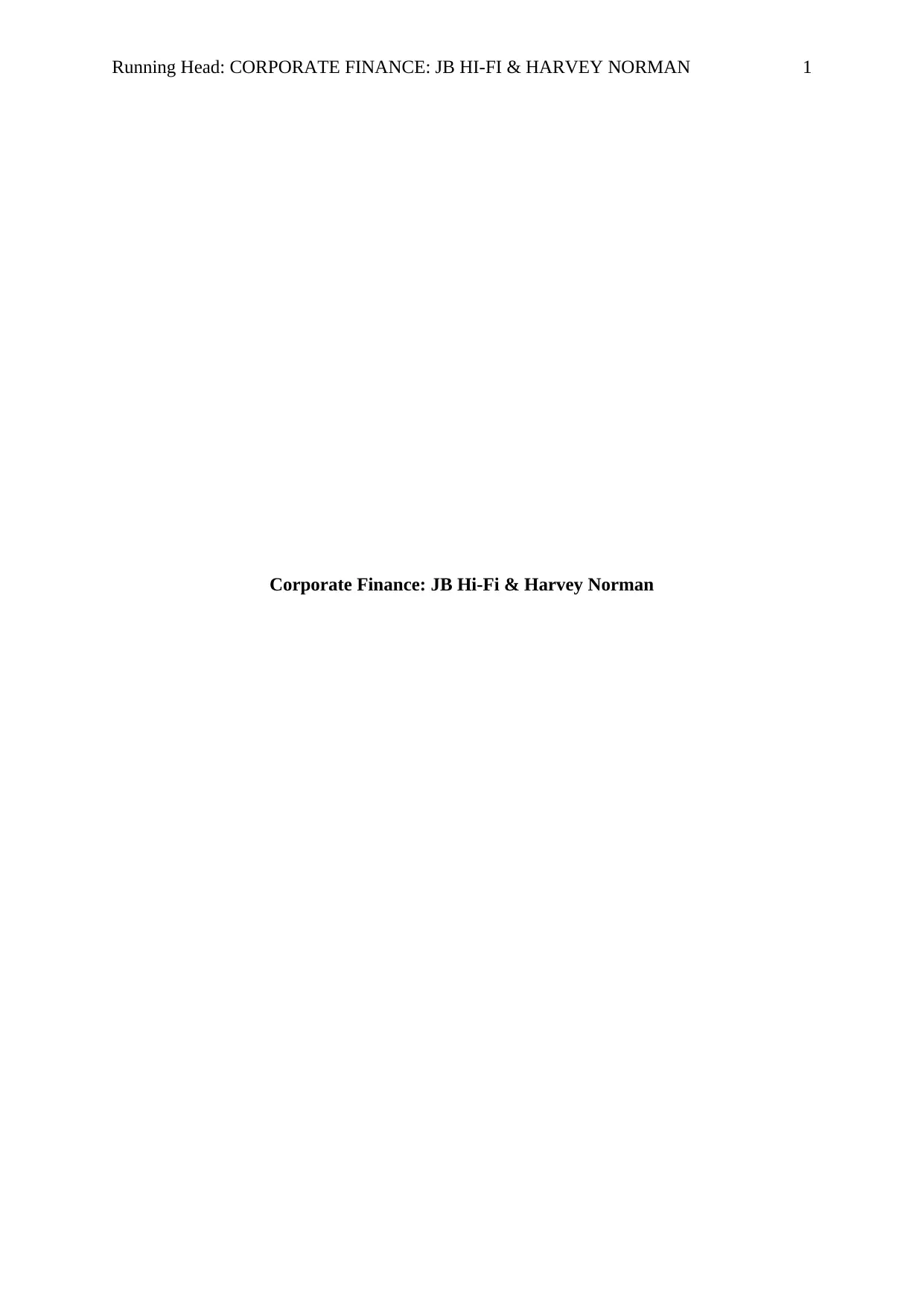
Running Head: CORPORATE FINANCE: JB HI-FI & HARVEY NORMAN 1
Corporate Finance: JB Hi-Fi & Harvey Norman
Corporate Finance: JB Hi-Fi & Harvey Norman
Paraphrase This Document
Need a fresh take? Get an instant paraphrase of this document with our AI Paraphraser
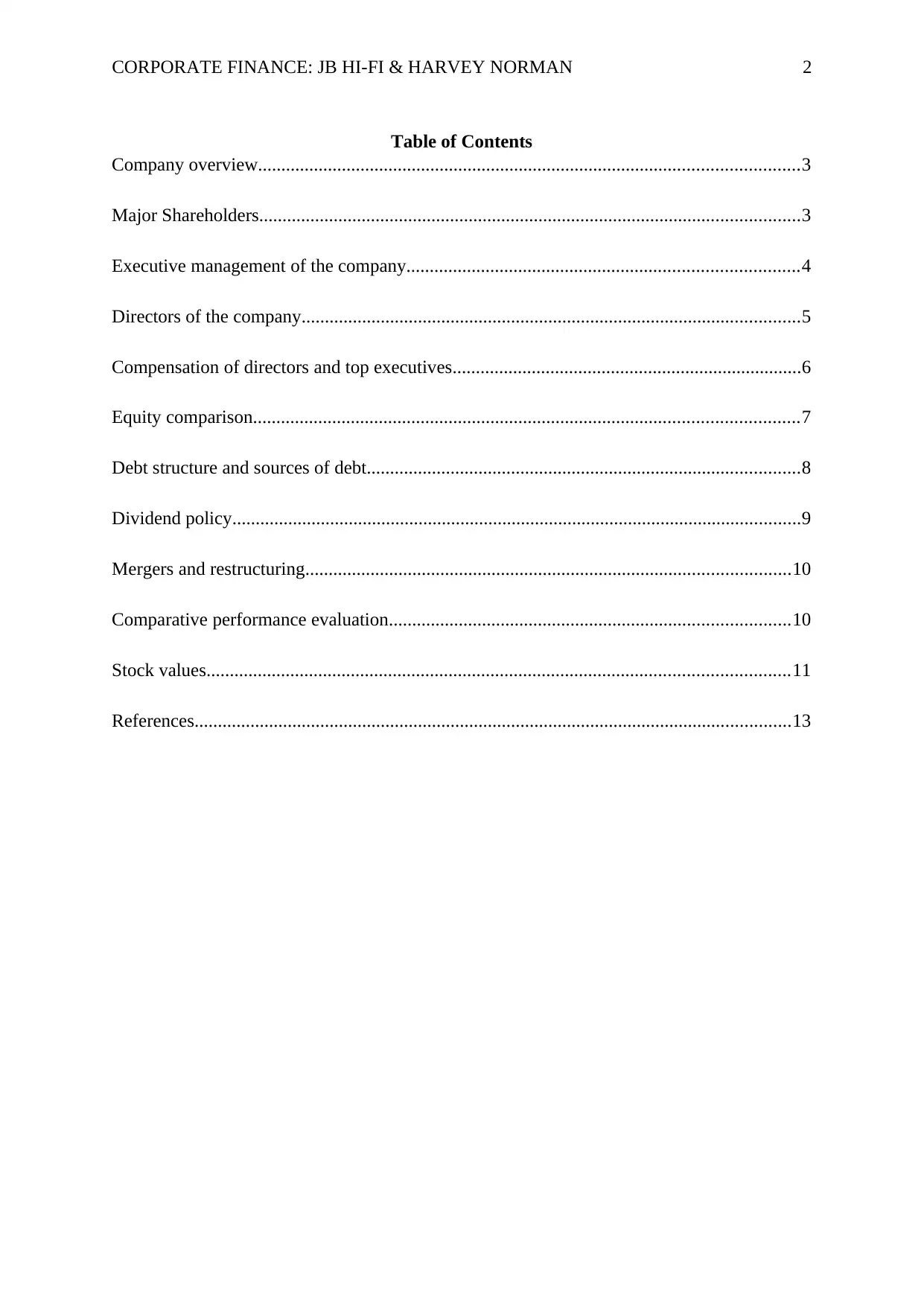
CORPORATE FINANCE: JB HI-FI & HARVEY NORMAN 2
Table of Contents
Company overview....................................................................................................................3
Major Shareholders....................................................................................................................3
Executive management of the company....................................................................................4
Directors of the company...........................................................................................................5
Compensation of directors and top executives...........................................................................6
Equity comparison.....................................................................................................................7
Debt structure and sources of debt.............................................................................................8
Dividend policy..........................................................................................................................9
Mergers and restructuring........................................................................................................10
Comparative performance evaluation......................................................................................10
Stock values.............................................................................................................................11
References................................................................................................................................13
Table of Contents
Company overview....................................................................................................................3
Major Shareholders....................................................................................................................3
Executive management of the company....................................................................................4
Directors of the company...........................................................................................................5
Compensation of directors and top executives...........................................................................6
Equity comparison.....................................................................................................................7
Debt structure and sources of debt.............................................................................................8
Dividend policy..........................................................................................................................9
Mergers and restructuring........................................................................................................10
Comparative performance evaluation......................................................................................10
Stock values.............................................................................................................................11
References................................................................................................................................13
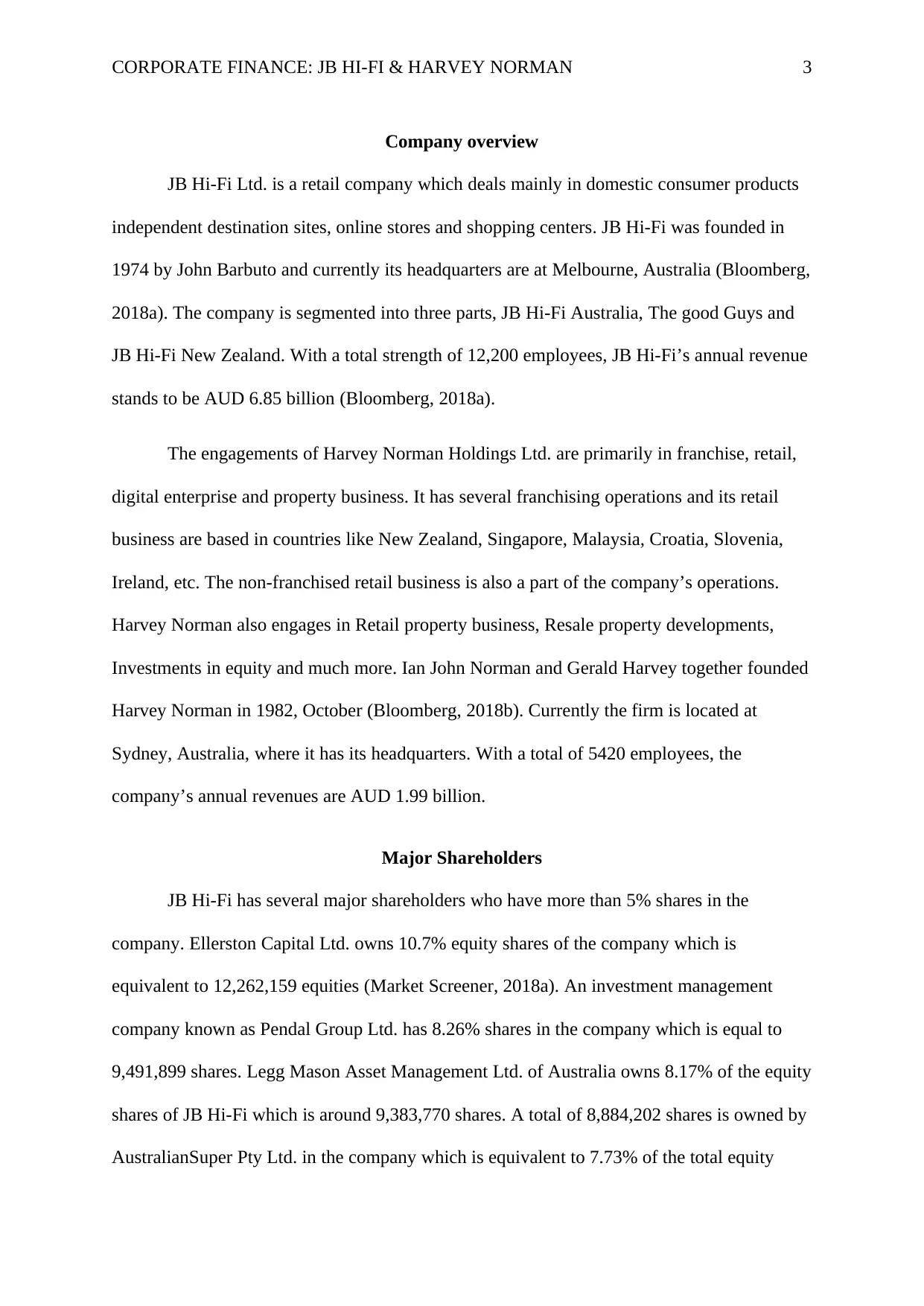
CORPORATE FINANCE: JB HI-FI & HARVEY NORMAN 3
Company overview
JB Hi-Fi Ltd. is a retail company which deals mainly in domestic consumer products
independent destination sites, online stores and shopping centers. JB Hi-Fi was founded in
1974 by John Barbuto and currently its headquarters are at Melbourne, Australia (Bloomberg,
2018a). The company is segmented into three parts, JB Hi-Fi Australia, The good Guys and
JB Hi-Fi New Zealand. With a total strength of 12,200 employees, JB Hi-Fi’s annual revenue
stands to be AUD 6.85 billion (Bloomberg, 2018a).
The engagements of Harvey Norman Holdings Ltd. are primarily in franchise, retail,
digital enterprise and property business. It has several franchising operations and its retail
business are based in countries like New Zealand, Singapore, Malaysia, Croatia, Slovenia,
Ireland, etc. The non-franchised retail business is also a part of the company’s operations.
Harvey Norman also engages in Retail property business, Resale property developments,
Investments in equity and much more. Ian John Norman and Gerald Harvey together founded
Harvey Norman in 1982, October (Bloomberg, 2018b). Currently the firm is located at
Sydney, Australia, where it has its headquarters. With a total of 5420 employees, the
company’s annual revenues are AUD 1.99 billion.
Major Shareholders
JB Hi-Fi has several major shareholders who have more than 5% shares in the
company. Ellerston Capital Ltd. owns 10.7% equity shares of the company which is
equivalent to 12,262,159 equities (Market Screener, 2018a). An investment management
company known as Pendal Group Ltd. has 8.26% shares in the company which is equal to
9,491,899 shares. Legg Mason Asset Management Ltd. of Australia owns 8.17% of the equity
shares of JB Hi-Fi which is around 9,383,770 shares. A total of 8,884,202 shares is owned by
AustralianSuper Pty Ltd. in the company which is equivalent to 7.73% of the total equity
Company overview
JB Hi-Fi Ltd. is a retail company which deals mainly in domestic consumer products
independent destination sites, online stores and shopping centers. JB Hi-Fi was founded in
1974 by John Barbuto and currently its headquarters are at Melbourne, Australia (Bloomberg,
2018a). The company is segmented into three parts, JB Hi-Fi Australia, The good Guys and
JB Hi-Fi New Zealand. With a total strength of 12,200 employees, JB Hi-Fi’s annual revenue
stands to be AUD 6.85 billion (Bloomberg, 2018a).
The engagements of Harvey Norman Holdings Ltd. are primarily in franchise, retail,
digital enterprise and property business. It has several franchising operations and its retail
business are based in countries like New Zealand, Singapore, Malaysia, Croatia, Slovenia,
Ireland, etc. The non-franchised retail business is also a part of the company’s operations.
Harvey Norman also engages in Retail property business, Resale property developments,
Investments in equity and much more. Ian John Norman and Gerald Harvey together founded
Harvey Norman in 1982, October (Bloomberg, 2018b). Currently the firm is located at
Sydney, Australia, where it has its headquarters. With a total of 5420 employees, the
company’s annual revenues are AUD 1.99 billion.
Major Shareholders
JB Hi-Fi has several major shareholders who have more than 5% shares in the
company. Ellerston Capital Ltd. owns 10.7% equity shares of the company which is
equivalent to 12,262,159 equities (Market Screener, 2018a). An investment management
company known as Pendal Group Ltd. has 8.26% shares in the company which is equal to
9,491,899 shares. Legg Mason Asset Management Ltd. of Australia owns 8.17% of the equity
shares of JB Hi-Fi which is around 9,383,770 shares. A total of 8,884,202 shares is owned by
AustralianSuper Pty Ltd. in the company which is equivalent to 7.73% of the total equity
⊘ This is a preview!⊘
Do you want full access?
Subscribe today to unlock all pages.

Trusted by 1+ million students worldwide
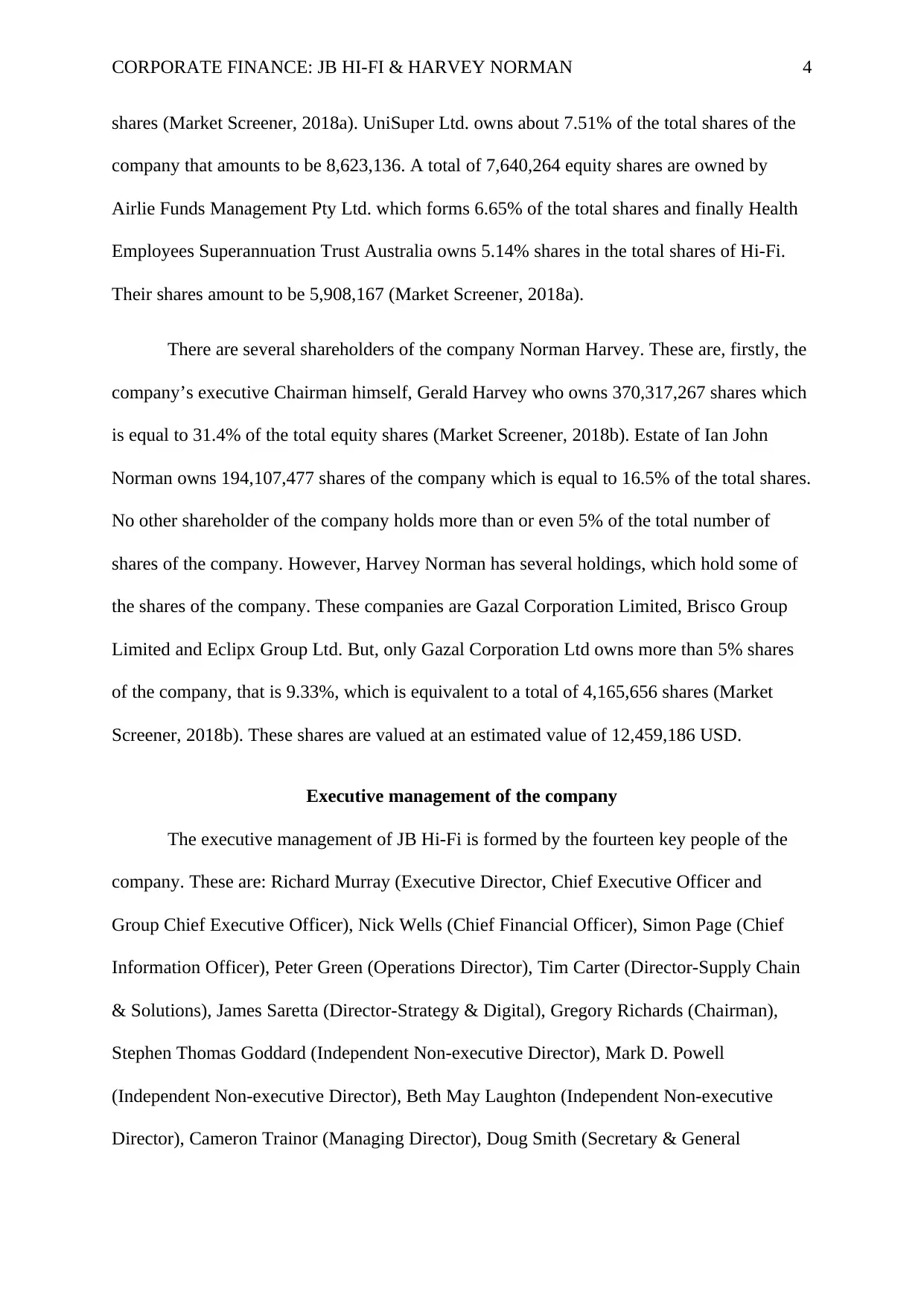
CORPORATE FINANCE: JB HI-FI & HARVEY NORMAN 4
shares (Market Screener, 2018a). UniSuper Ltd. owns about 7.51% of the total shares of the
company that amounts to be 8,623,136. A total of 7,640,264 equity shares are owned by
Airlie Funds Management Pty Ltd. which forms 6.65% of the total shares and finally Health
Employees Superannuation Trust Australia owns 5.14% shares in the total shares of Hi-Fi.
Their shares amount to be 5,908,167 (Market Screener, 2018a).
There are several shareholders of the company Norman Harvey. These are, firstly, the
company’s executive Chairman himself, Gerald Harvey who owns 370,317,267 shares which
is equal to 31.4% of the total equity shares (Market Screener, 2018b). Estate of Ian John
Norman owns 194,107,477 shares of the company which is equal to 16.5% of the total shares.
No other shareholder of the company holds more than or even 5% of the total number of
shares of the company. However, Harvey Norman has several holdings, which hold some of
the shares of the company. These companies are Gazal Corporation Limited, Brisco Group
Limited and Eclipx Group Ltd. But, only Gazal Corporation Ltd owns more than 5% shares
of the company, that is 9.33%, which is equivalent to a total of 4,165,656 shares (Market
Screener, 2018b). These shares are valued at an estimated value of 12,459,186 USD.
Executive management of the company
The executive management of JB Hi-Fi is formed by the fourteen key people of the
company. These are: Richard Murray (Executive Director, Chief Executive Officer and
Group Chief Executive Officer), Nick Wells (Chief Financial Officer), Simon Page (Chief
Information Officer), Peter Green (Operations Director), Tim Carter (Director-Supply Chain
& Solutions), James Saretta (Director-Strategy & Digital), Gregory Richards (Chairman),
Stephen Thomas Goddard (Independent Non-executive Director), Mark D. Powell
(Independent Non-executive Director), Beth May Laughton (Independent Non-executive
Director), Cameron Trainor (Managing Director), Doug Smith (Secretary & General
shares (Market Screener, 2018a). UniSuper Ltd. owns about 7.51% of the total shares of the
company that amounts to be 8,623,136. A total of 7,640,264 equity shares are owned by
Airlie Funds Management Pty Ltd. which forms 6.65% of the total shares and finally Health
Employees Superannuation Trust Australia owns 5.14% shares in the total shares of Hi-Fi.
Their shares amount to be 5,908,167 (Market Screener, 2018a).
There are several shareholders of the company Norman Harvey. These are, firstly, the
company’s executive Chairman himself, Gerald Harvey who owns 370,317,267 shares which
is equal to 31.4% of the total equity shares (Market Screener, 2018b). Estate of Ian John
Norman owns 194,107,477 shares of the company which is equal to 16.5% of the total shares.
No other shareholder of the company holds more than or even 5% of the total number of
shares of the company. However, Harvey Norman has several holdings, which hold some of
the shares of the company. These companies are Gazal Corporation Limited, Brisco Group
Limited and Eclipx Group Ltd. But, only Gazal Corporation Ltd owns more than 5% shares
of the company, that is 9.33%, which is equivalent to a total of 4,165,656 shares (Market
Screener, 2018b). These shares are valued at an estimated value of 12,459,186 USD.
Executive management of the company
The executive management of JB Hi-Fi is formed by the fourteen key people of the
company. These are: Richard Murray (Executive Director, Chief Executive Officer and
Group Chief Executive Officer), Nick Wells (Chief Financial Officer), Simon Page (Chief
Information Officer), Peter Green (Operations Director), Tim Carter (Director-Supply Chain
& Solutions), James Saretta (Director-Strategy & Digital), Gregory Richards (Chairman),
Stephen Thomas Goddard (Independent Non-executive Director), Mark D. Powell
(Independent Non-executive Director), Beth May Laughton (Independent Non-executive
Director), Cameron Trainor (Managing Director), Doug Smith (Secretary & General
Paraphrase This Document
Need a fresh take? Get an instant paraphrase of this document with our AI Paraphraser
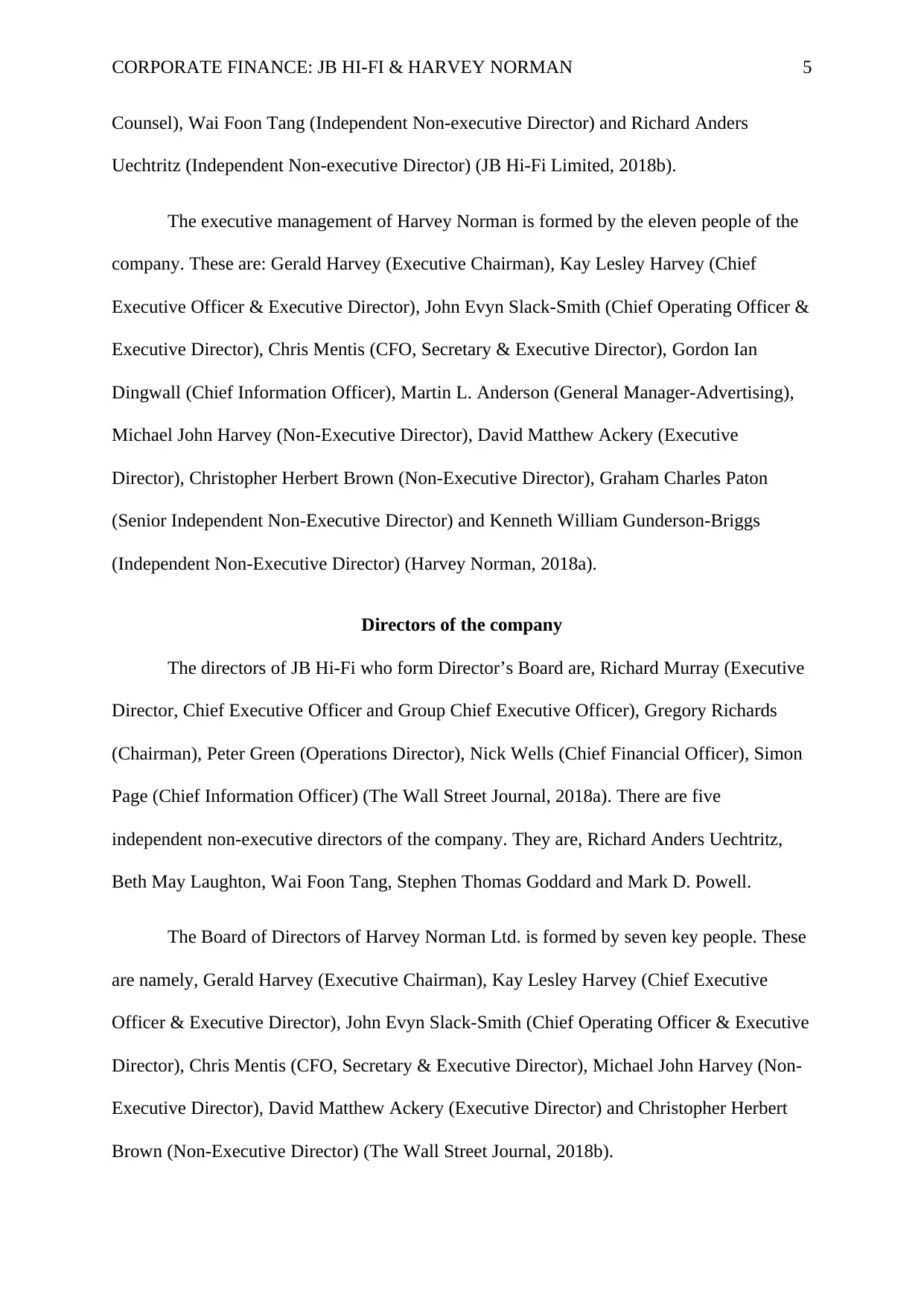
CORPORATE FINANCE: JB HI-FI & HARVEY NORMAN 5
Counsel), Wai Foon Tang (Independent Non-executive Director) and Richard Anders
Uechtritz (Independent Non-executive Director) (JB Hi-Fi Limited, 2018b).
The executive management of Harvey Norman is formed by the eleven people of the
company. These are: Gerald Harvey (Executive Chairman), Kay Lesley Harvey (Chief
Executive Officer & Executive Director), John Evyn Slack-Smith (Chief Operating Officer &
Executive Director), Chris Mentis (CFO, Secretary & Executive Director), Gordon Ian
Dingwall (Chief Information Officer), Martin L. Anderson (General Manager-Advertising),
Michael John Harvey (Non-Executive Director), David Matthew Ackery (Executive
Director), Christopher Herbert Brown (Non-Executive Director), Graham Charles Paton
(Senior Independent Non-Executive Director) and Kenneth William Gunderson-Briggs
(Independent Non-Executive Director) (Harvey Norman, 2018a).
Directors of the company
The directors of JB Hi-Fi who form Director’s Board are, Richard Murray (Executive
Director, Chief Executive Officer and Group Chief Executive Officer), Gregory Richards
(Chairman), Peter Green (Operations Director), Nick Wells (Chief Financial Officer), Simon
Page (Chief Information Officer) (The Wall Street Journal, 2018a). There are five
independent non-executive directors of the company. They are, Richard Anders Uechtritz,
Beth May Laughton, Wai Foon Tang, Stephen Thomas Goddard and Mark D. Powell.
The Board of Directors of Harvey Norman Ltd. is formed by seven key people. These
are namely, Gerald Harvey (Executive Chairman), Kay Lesley Harvey (Chief Executive
Officer & Executive Director), John Evyn Slack-Smith (Chief Operating Officer & Executive
Director), Chris Mentis (CFO, Secretary & Executive Director), Michael John Harvey (Non-
Executive Director), David Matthew Ackery (Executive Director) and Christopher Herbert
Brown (Non-Executive Director) (The Wall Street Journal, 2018b).
Counsel), Wai Foon Tang (Independent Non-executive Director) and Richard Anders
Uechtritz (Independent Non-executive Director) (JB Hi-Fi Limited, 2018b).
The executive management of Harvey Norman is formed by the eleven people of the
company. These are: Gerald Harvey (Executive Chairman), Kay Lesley Harvey (Chief
Executive Officer & Executive Director), John Evyn Slack-Smith (Chief Operating Officer &
Executive Director), Chris Mentis (CFO, Secretary & Executive Director), Gordon Ian
Dingwall (Chief Information Officer), Martin L. Anderson (General Manager-Advertising),
Michael John Harvey (Non-Executive Director), David Matthew Ackery (Executive
Director), Christopher Herbert Brown (Non-Executive Director), Graham Charles Paton
(Senior Independent Non-Executive Director) and Kenneth William Gunderson-Briggs
(Independent Non-Executive Director) (Harvey Norman, 2018a).
Directors of the company
The directors of JB Hi-Fi who form Director’s Board are, Richard Murray (Executive
Director, Chief Executive Officer and Group Chief Executive Officer), Gregory Richards
(Chairman), Peter Green (Operations Director), Nick Wells (Chief Financial Officer), Simon
Page (Chief Information Officer) (The Wall Street Journal, 2018a). There are five
independent non-executive directors of the company. They are, Richard Anders Uechtritz,
Beth May Laughton, Wai Foon Tang, Stephen Thomas Goddard and Mark D. Powell.
The Board of Directors of Harvey Norman Ltd. is formed by seven key people. These
are namely, Gerald Harvey (Executive Chairman), Kay Lesley Harvey (Chief Executive
Officer & Executive Director), John Evyn Slack-Smith (Chief Operating Officer & Executive
Director), Chris Mentis (CFO, Secretary & Executive Director), Michael John Harvey (Non-
Executive Director), David Matthew Ackery (Executive Director) and Christopher Herbert
Brown (Non-Executive Director) (The Wall Street Journal, 2018b).
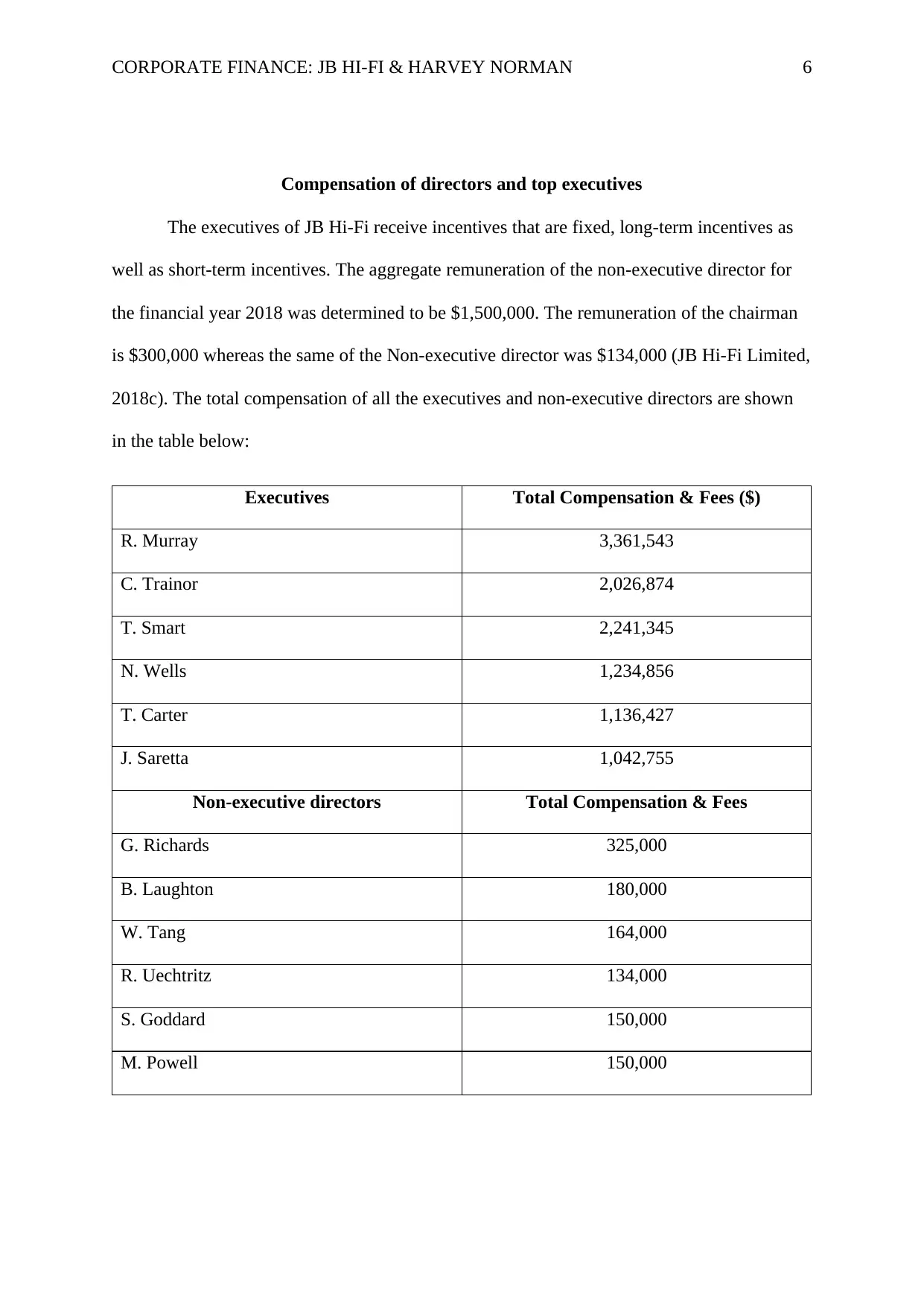
CORPORATE FINANCE: JB HI-FI & HARVEY NORMAN 6
Compensation of directors and top executives
The executives of JB Hi-Fi receive incentives that are fixed, long-term incentives as
well as short-term incentives. The aggregate remuneration of the non-executive director for
the financial year 2018 was determined to be $1,500,000. The remuneration of the chairman
is $300,000 whereas the same of the Non-executive director was $134,000 (JB Hi-Fi Limited,
2018c). The total compensation of all the executives and non-executive directors are shown
in the table below:
Executives Total Compensation & Fees ($)
R. Murray 3,361,543
C. Trainor 2,026,874
T. Smart 2,241,345
N. Wells 1,234,856
T. Carter 1,136,427
J. Saretta 1,042,755
Non-executive directors Total Compensation & Fees
G. Richards 325,000
B. Laughton 180,000
W. Tang 164,000
R. Uechtritz 134,000
S. Goddard 150,000
M. Powell 150,000
Compensation of directors and top executives
The executives of JB Hi-Fi receive incentives that are fixed, long-term incentives as
well as short-term incentives. The aggregate remuneration of the non-executive director for
the financial year 2018 was determined to be $1,500,000. The remuneration of the chairman
is $300,000 whereas the same of the Non-executive director was $134,000 (JB Hi-Fi Limited,
2018c). The total compensation of all the executives and non-executive directors are shown
in the table below:
Executives Total Compensation & Fees ($)
R. Murray 3,361,543
C. Trainor 2,026,874
T. Smart 2,241,345
N. Wells 1,234,856
T. Carter 1,136,427
J. Saretta 1,042,755
Non-executive directors Total Compensation & Fees
G. Richards 325,000
B. Laughton 180,000
W. Tang 164,000
R. Uechtritz 134,000
S. Goddard 150,000
M. Powell 150,000
⊘ This is a preview!⊘
Do you want full access?
Subscribe today to unlock all pages.

Trusted by 1+ million students worldwide
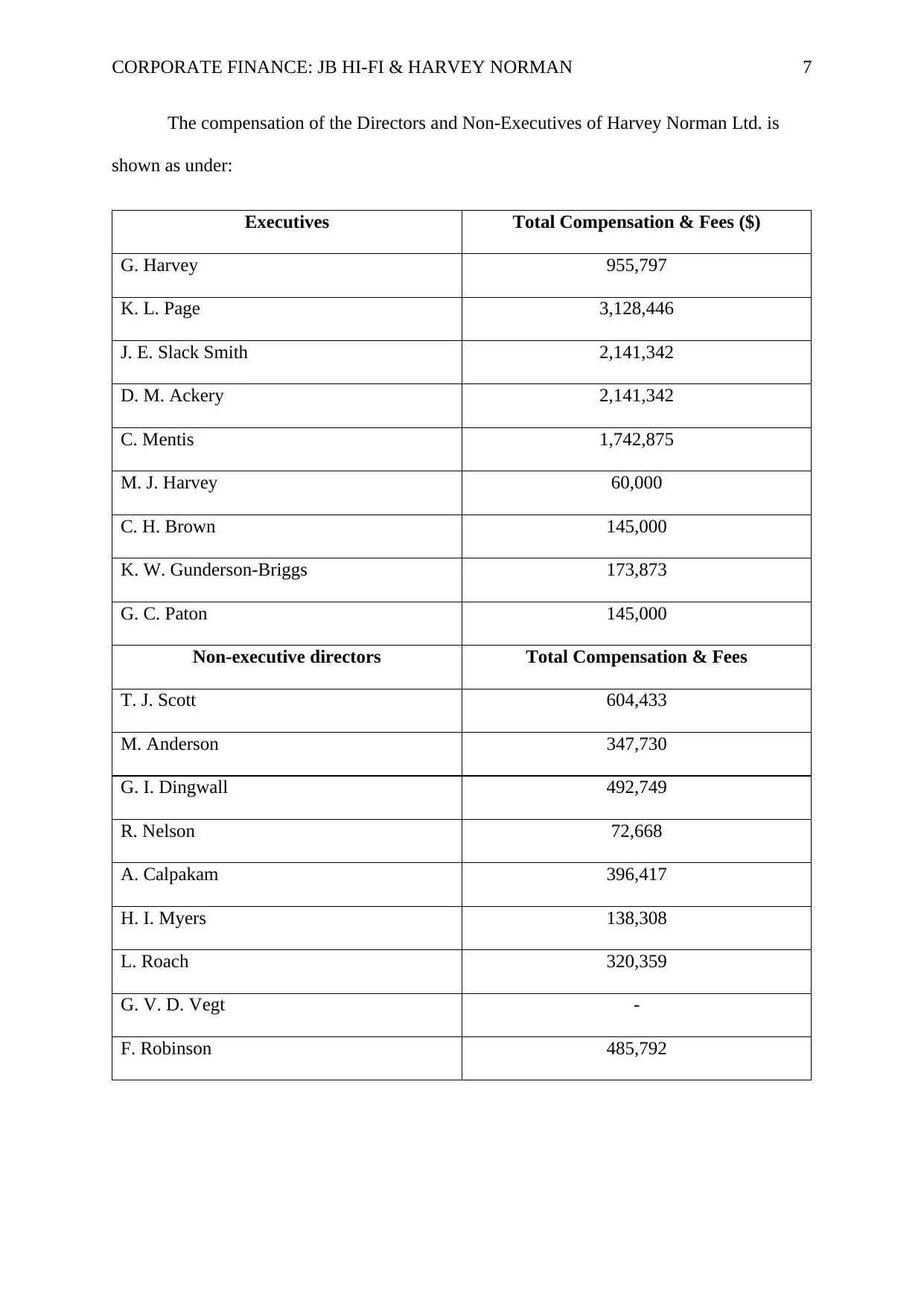
CORPORATE FINANCE: JB HI-FI & HARVEY NORMAN 7
The compensation of the Directors and Non-Executives of Harvey Norman Ltd. is
shown as under:
Executives Total Compensation & Fees ($)
G. Harvey 955,797
K. L. Page 3,128,446
J. E. Slack Smith 2,141,342
D. M. Ackery 2,141,342
C. Mentis 1,742,875
M. J. Harvey 60,000
C. H. Brown 145,000
K. W. Gunderson-Briggs 173,873
G. C. Paton 145,000
Non-executive directors Total Compensation & Fees
T. J. Scott 604,433
M. Anderson 347,730
G. I. Dingwall 492,749
R. Nelson 72,668
A. Calpakam 396,417
H. I. Myers 138,308
L. Roach 320,359
G. V. D. Vegt -
F. Robinson 485,792
The compensation of the Directors and Non-Executives of Harvey Norman Ltd. is
shown as under:
Executives Total Compensation & Fees ($)
G. Harvey 955,797
K. L. Page 3,128,446
J. E. Slack Smith 2,141,342
D. M. Ackery 2,141,342
C. Mentis 1,742,875
M. J. Harvey 60,000
C. H. Brown 145,000
K. W. Gunderson-Briggs 173,873
G. C. Paton 145,000
Non-executive directors Total Compensation & Fees
T. J. Scott 604,433
M. Anderson 347,730
G. I. Dingwall 492,749
R. Nelson 72,668
A. Calpakam 396,417
H. I. Myers 138,308
L. Roach 320,359
G. V. D. Vegt -
F. Robinson 485,792
Paraphrase This Document
Need a fresh take? Get an instant paraphrase of this document with our AI Paraphraser
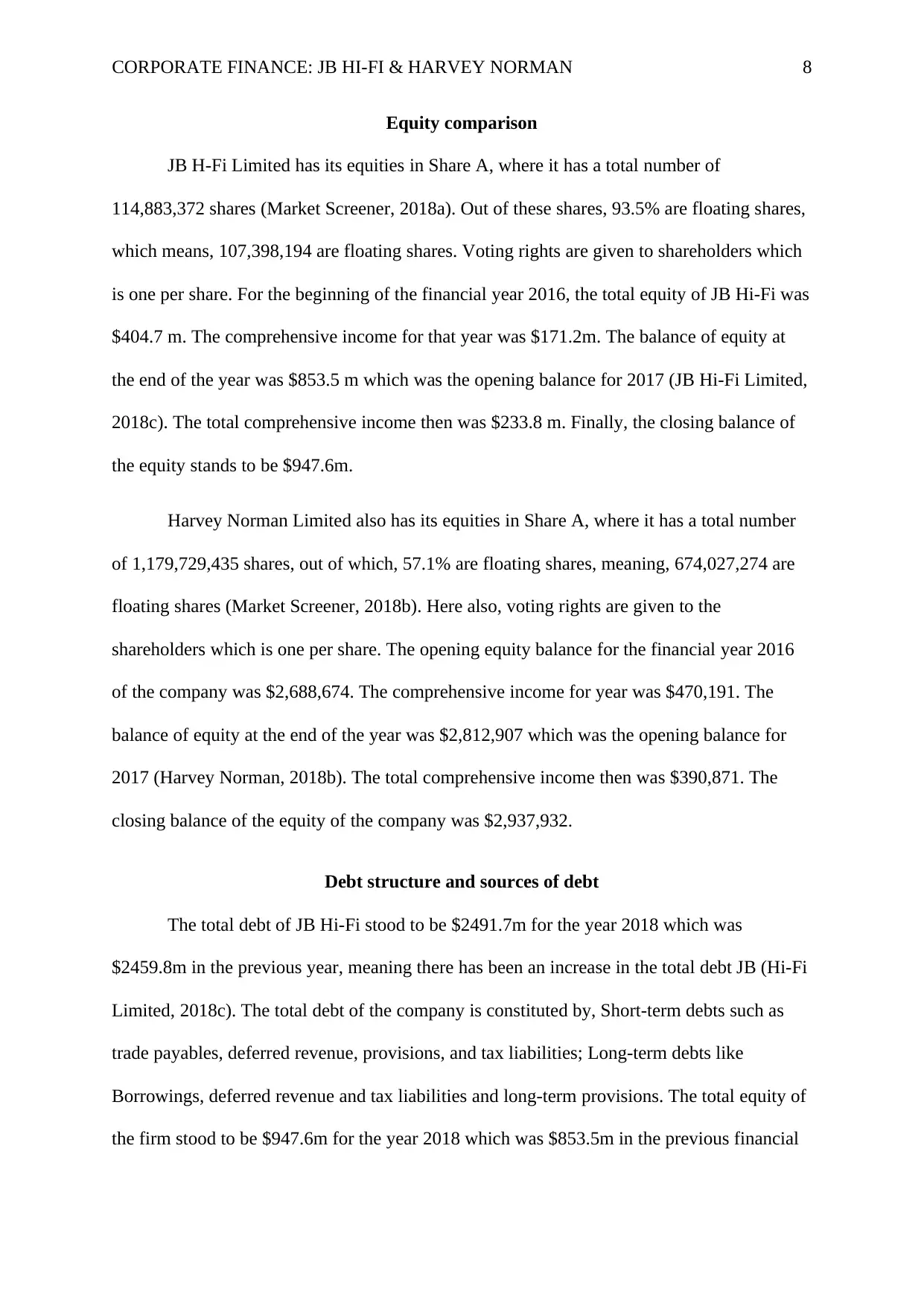
CORPORATE FINANCE: JB HI-FI & HARVEY NORMAN 8
Equity comparison
JB H-Fi Limited has its equities in Share A, where it has a total number of
114,883,372 shares (Market Screener, 2018a). Out of these shares, 93.5% are floating shares,
which means, 107,398,194 are floating shares. Voting rights are given to shareholders which
is one per share. For the beginning of the financial year 2016, the total equity of JB Hi-Fi was
$404.7 m. The comprehensive income for that year was $171.2m. The balance of equity at
the end of the year was $853.5 m which was the opening balance for 2017 (JB Hi-Fi Limited,
2018c). The total comprehensive income then was $233.8 m. Finally, the closing balance of
the equity stands to be $947.6m.
Harvey Norman Limited also has its equities in Share A, where it has a total number
of 1,179,729,435 shares, out of which, 57.1% are floating shares, meaning, 674,027,274 are
floating shares (Market Screener, 2018b). Here also, voting rights are given to the
shareholders which is one per share. The opening equity balance for the financial year 2016
of the company was $2,688,674. The comprehensive income for year was $470,191. The
balance of equity at the end of the year was $2,812,907 which was the opening balance for
2017 (Harvey Norman, 2018b). The total comprehensive income then was $390,871. The
closing balance of the equity of the company was $2,937,932.
Debt structure and sources of debt
The total debt of JB Hi-Fi stood to be $2491.7m for the year 2018 which was
$2459.8m in the previous year, meaning there has been an increase in the total debt JB (Hi-Fi
Limited, 2018c). The total debt of the company is constituted by, Short-term debts such as
trade payables, deferred revenue, provisions, and tax liabilities; Long-term debts like
Borrowings, deferred revenue and tax liabilities and long-term provisions. The total equity of
the firm stood to be $947.6m for the year 2018 which was $853.5m in the previous financial
Equity comparison
JB H-Fi Limited has its equities in Share A, where it has a total number of
114,883,372 shares (Market Screener, 2018a). Out of these shares, 93.5% are floating shares,
which means, 107,398,194 are floating shares. Voting rights are given to shareholders which
is one per share. For the beginning of the financial year 2016, the total equity of JB Hi-Fi was
$404.7 m. The comprehensive income for that year was $171.2m. The balance of equity at
the end of the year was $853.5 m which was the opening balance for 2017 (JB Hi-Fi Limited,
2018c). The total comprehensive income then was $233.8 m. Finally, the closing balance of
the equity stands to be $947.6m.
Harvey Norman Limited also has its equities in Share A, where it has a total number
of 1,179,729,435 shares, out of which, 57.1% are floating shares, meaning, 674,027,274 are
floating shares (Market Screener, 2018b). Here also, voting rights are given to the
shareholders which is one per share. The opening equity balance for the financial year 2016
of the company was $2,688,674. The comprehensive income for year was $470,191. The
balance of equity at the end of the year was $2,812,907 which was the opening balance for
2017 (Harvey Norman, 2018b). The total comprehensive income then was $390,871. The
closing balance of the equity of the company was $2,937,932.
Debt structure and sources of debt
The total debt of JB Hi-Fi stood to be $2491.7m for the year 2018 which was
$2459.8m in the previous year, meaning there has been an increase in the total debt JB (Hi-Fi
Limited, 2018c). The total debt of the company is constituted by, Short-term debts such as
trade payables, deferred revenue, provisions, and tax liabilities; Long-term debts like
Borrowings, deferred revenue and tax liabilities and long-term provisions. The total equity of
the firm stood to be $947.6m for the year 2018 which was $853.5m in the previous financial
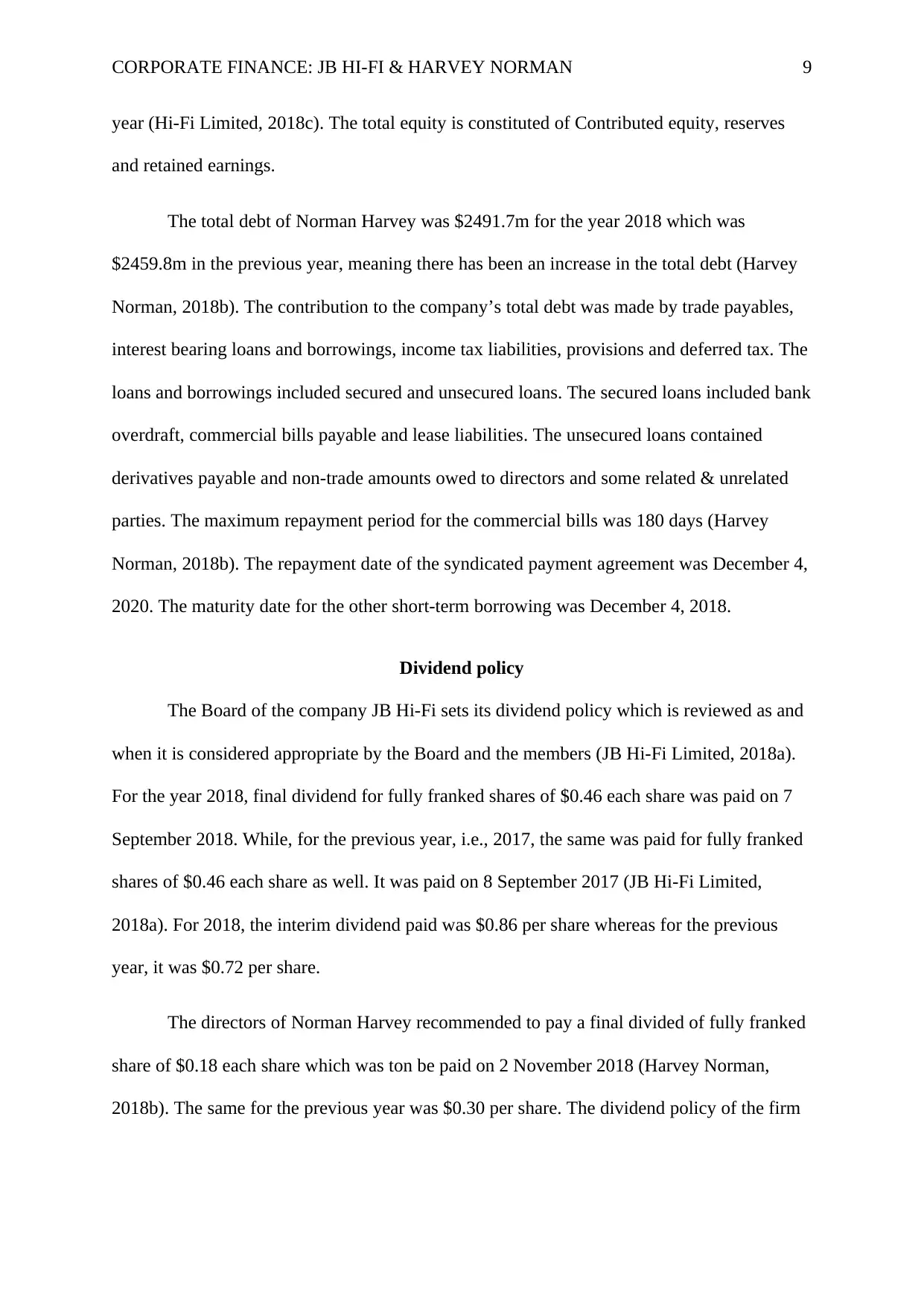
CORPORATE FINANCE: JB HI-FI & HARVEY NORMAN 9
year (Hi-Fi Limited, 2018c). The total equity is constituted of Contributed equity, reserves
and retained earnings.
The total debt of Norman Harvey was $2491.7m for the year 2018 which was
$2459.8m in the previous year, meaning there has been an increase in the total debt (Harvey
Norman, 2018b). The contribution to the company’s total debt was made by trade payables,
interest bearing loans and borrowings, income tax liabilities, provisions and deferred tax. The
loans and borrowings included secured and unsecured loans. The secured loans included bank
overdraft, commercial bills payable and lease liabilities. The unsecured loans contained
derivatives payable and non-trade amounts owed to directors and some related & unrelated
parties. The maximum repayment period for the commercial bills was 180 days (Harvey
Norman, 2018b). The repayment date of the syndicated payment agreement was December 4,
2020. The maturity date for the other short-term borrowing was December 4, 2018.
Dividend policy
The Board of the company JB Hi-Fi sets its dividend policy which is reviewed as and
when it is considered appropriate by the Board and the members (JB Hi-Fi Limited, 2018a).
For the year 2018, final dividend for fully franked shares of $0.46 each share was paid on 7
September 2018. While, for the previous year, i.e., 2017, the same was paid for fully franked
shares of $0.46 each share as well. It was paid on 8 September 2017 (JB Hi-Fi Limited,
2018a). For 2018, the interim dividend paid was $0.86 per share whereas for the previous
year, it was $0.72 per share.
The directors of Norman Harvey recommended to pay a final divided of fully franked
share of $0.18 each share which was ton be paid on 2 November 2018 (Harvey Norman,
2018b). The same for the previous year was $0.30 per share. The dividend policy of the firm
year (Hi-Fi Limited, 2018c). The total equity is constituted of Contributed equity, reserves
and retained earnings.
The total debt of Norman Harvey was $2491.7m for the year 2018 which was
$2459.8m in the previous year, meaning there has been an increase in the total debt (Harvey
Norman, 2018b). The contribution to the company’s total debt was made by trade payables,
interest bearing loans and borrowings, income tax liabilities, provisions and deferred tax. The
loans and borrowings included secured and unsecured loans. The secured loans included bank
overdraft, commercial bills payable and lease liabilities. The unsecured loans contained
derivatives payable and non-trade amounts owed to directors and some related & unrelated
parties. The maximum repayment period for the commercial bills was 180 days (Harvey
Norman, 2018b). The repayment date of the syndicated payment agreement was December 4,
2020. The maturity date for the other short-term borrowing was December 4, 2018.
Dividend policy
The Board of the company JB Hi-Fi sets its dividend policy which is reviewed as and
when it is considered appropriate by the Board and the members (JB Hi-Fi Limited, 2018a).
For the year 2018, final dividend for fully franked shares of $0.46 each share was paid on 7
September 2018. While, for the previous year, i.e., 2017, the same was paid for fully franked
shares of $0.46 each share as well. It was paid on 8 September 2017 (JB Hi-Fi Limited,
2018a). For 2018, the interim dividend paid was $0.86 per share whereas for the previous
year, it was $0.72 per share.
The directors of Norman Harvey recommended to pay a final divided of fully franked
share of $0.18 each share which was ton be paid on 2 November 2018 (Harvey Norman,
2018b). The same for the previous year was $0.30 per share. The dividend policy of the firm
⊘ This is a preview!⊘
Do you want full access?
Subscribe today to unlock all pages.

Trusted by 1+ million students worldwide
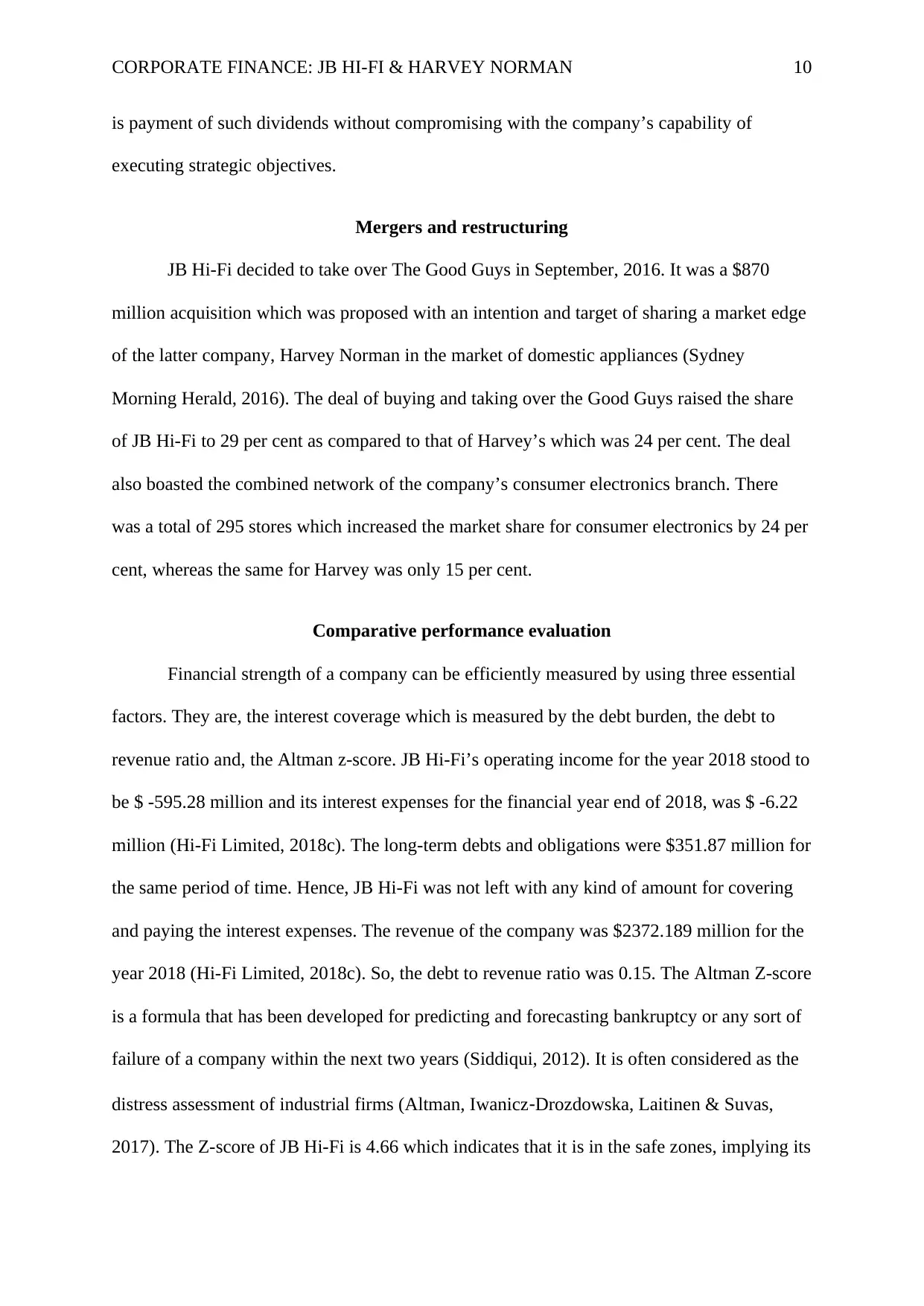
CORPORATE FINANCE: JB HI-FI & HARVEY NORMAN 10
is payment of such dividends without compromising with the company’s capability of
executing strategic objectives.
Mergers and restructuring
JB Hi-Fi decided to take over The Good Guys in September, 2016. It was a $870
million acquisition which was proposed with an intention and target of sharing a market edge
of the latter company, Harvey Norman in the market of domestic appliances (Sydney
Morning Herald, 2016). The deal of buying and taking over the Good Guys raised the share
of JB Hi-Fi to 29 per cent as compared to that of Harvey’s which was 24 per cent. The deal
also boasted the combined network of the company’s consumer electronics branch. There
was a total of 295 stores which increased the market share for consumer electronics by 24 per
cent, whereas the same for Harvey was only 15 per cent.
Comparative performance evaluation
Financial strength of a company can be efficiently measured by using three essential
factors. They are, the interest coverage which is measured by the debt burden, the debt to
revenue ratio and, the Altman z-score. JB Hi-Fi’s operating income for the year 2018 stood to
be $ -595.28 million and its interest expenses for the financial year end of 2018, was $ -6.22
million (Hi-Fi Limited, 2018c). The long-term debts and obligations were $351.87 million for
the same period of time. Hence, JB Hi-Fi was not left with any kind of amount for covering
and paying the interest expenses. The revenue of the company was $2372.189 million for the
year 2018 (Hi-Fi Limited, 2018c). So, the debt to revenue ratio was 0.15. The Altman Z-score
is a formula that has been developed for predicting and forecasting bankruptcy or any sort of
failure of a company within the next two years (Siddiqui, 2012). It is often considered as the
distress assessment of industrial firms (Altman, Iwanicz‐Drozdowska, Laitinen & Suvas,
2017). The Z-score of JB Hi-Fi is 4.66 which indicates that it is in the safe zones, implying its
is payment of such dividends without compromising with the company’s capability of
executing strategic objectives.
Mergers and restructuring
JB Hi-Fi decided to take over The Good Guys in September, 2016. It was a $870
million acquisition which was proposed with an intention and target of sharing a market edge
of the latter company, Harvey Norman in the market of domestic appliances (Sydney
Morning Herald, 2016). The deal of buying and taking over the Good Guys raised the share
of JB Hi-Fi to 29 per cent as compared to that of Harvey’s which was 24 per cent. The deal
also boasted the combined network of the company’s consumer electronics branch. There
was a total of 295 stores which increased the market share for consumer electronics by 24 per
cent, whereas the same for Harvey was only 15 per cent.
Comparative performance evaluation
Financial strength of a company can be efficiently measured by using three essential
factors. They are, the interest coverage which is measured by the debt burden, the debt to
revenue ratio and, the Altman z-score. JB Hi-Fi’s operating income for the year 2018 stood to
be $ -595.28 million and its interest expenses for the financial year end of 2018, was $ -6.22
million (Hi-Fi Limited, 2018c). The long-term debts and obligations were $351.87 million for
the same period of time. Hence, JB Hi-Fi was not left with any kind of amount for covering
and paying the interest expenses. The revenue of the company was $2372.189 million for the
year 2018 (Hi-Fi Limited, 2018c). So, the debt to revenue ratio was 0.15. The Altman Z-score
is a formula that has been developed for predicting and forecasting bankruptcy or any sort of
failure of a company within the next two years (Siddiqui, 2012). It is often considered as the
distress assessment of industrial firms (Altman, Iwanicz‐Drozdowska, Laitinen & Suvas,
2017). The Z-score of JB Hi-Fi is 4.66 which indicates that it is in the safe zones, implying its
Paraphrase This Document
Need a fresh take? Get an instant paraphrase of this document with our AI Paraphraser
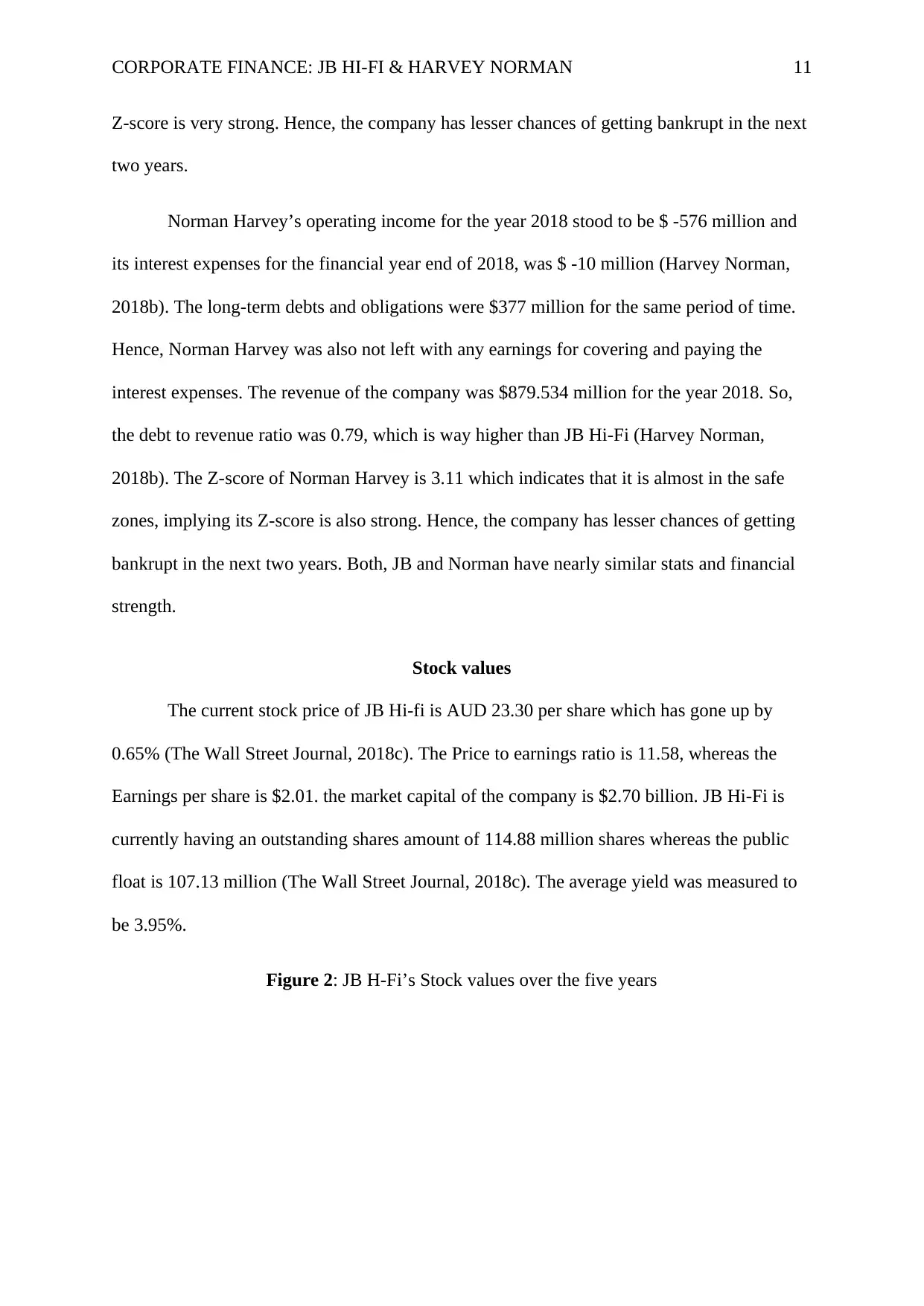
CORPORATE FINANCE: JB HI-FI & HARVEY NORMAN 11
Z-score is very strong. Hence, the company has lesser chances of getting bankrupt in the next
two years.
Norman Harvey’s operating income for the year 2018 stood to be $ -576 million and
its interest expenses for the financial year end of 2018, was $ -10 million (Harvey Norman,
2018b). The long-term debts and obligations were $377 million for the same period of time.
Hence, Norman Harvey was also not left with any earnings for covering and paying the
interest expenses. The revenue of the company was $879.534 million for the year 2018. So,
the debt to revenue ratio was 0.79, which is way higher than JB Hi-Fi (Harvey Norman,
2018b). The Z-score of Norman Harvey is 3.11 which indicates that it is almost in the safe
zones, implying its Z-score is also strong. Hence, the company has lesser chances of getting
bankrupt in the next two years. Both, JB and Norman have nearly similar stats and financial
strength.
Stock values
The current stock price of JB Hi-fi is AUD 23.30 per share which has gone up by
0.65% (The Wall Street Journal, 2018c). The Price to earnings ratio is 11.58, whereas the
Earnings per share is $2.01. the market capital of the company is $2.70 billion. JB Hi-Fi is
currently having an outstanding shares amount of 114.88 million shares whereas the public
float is 107.13 million (The Wall Street Journal, 2018c). The average yield was measured to
be 3.95%.
Figure 2: JB H-Fi’s Stock values over the five years
Z-score is very strong. Hence, the company has lesser chances of getting bankrupt in the next
two years.
Norman Harvey’s operating income for the year 2018 stood to be $ -576 million and
its interest expenses for the financial year end of 2018, was $ -10 million (Harvey Norman,
2018b). The long-term debts and obligations were $377 million for the same period of time.
Hence, Norman Harvey was also not left with any earnings for covering and paying the
interest expenses. The revenue of the company was $879.534 million for the year 2018. So,
the debt to revenue ratio was 0.79, which is way higher than JB Hi-Fi (Harvey Norman,
2018b). The Z-score of Norman Harvey is 3.11 which indicates that it is almost in the safe
zones, implying its Z-score is also strong. Hence, the company has lesser chances of getting
bankrupt in the next two years. Both, JB and Norman have nearly similar stats and financial
strength.
Stock values
The current stock price of JB Hi-fi is AUD 23.30 per share which has gone up by
0.65% (The Wall Street Journal, 2018c). The Price to earnings ratio is 11.58, whereas the
Earnings per share is $2.01. the market capital of the company is $2.70 billion. JB Hi-Fi is
currently having an outstanding shares amount of 114.88 million shares whereas the public
float is 107.13 million (The Wall Street Journal, 2018c). The average yield was measured to
be 3.95%.
Figure 2: JB H-Fi’s Stock values over the five years
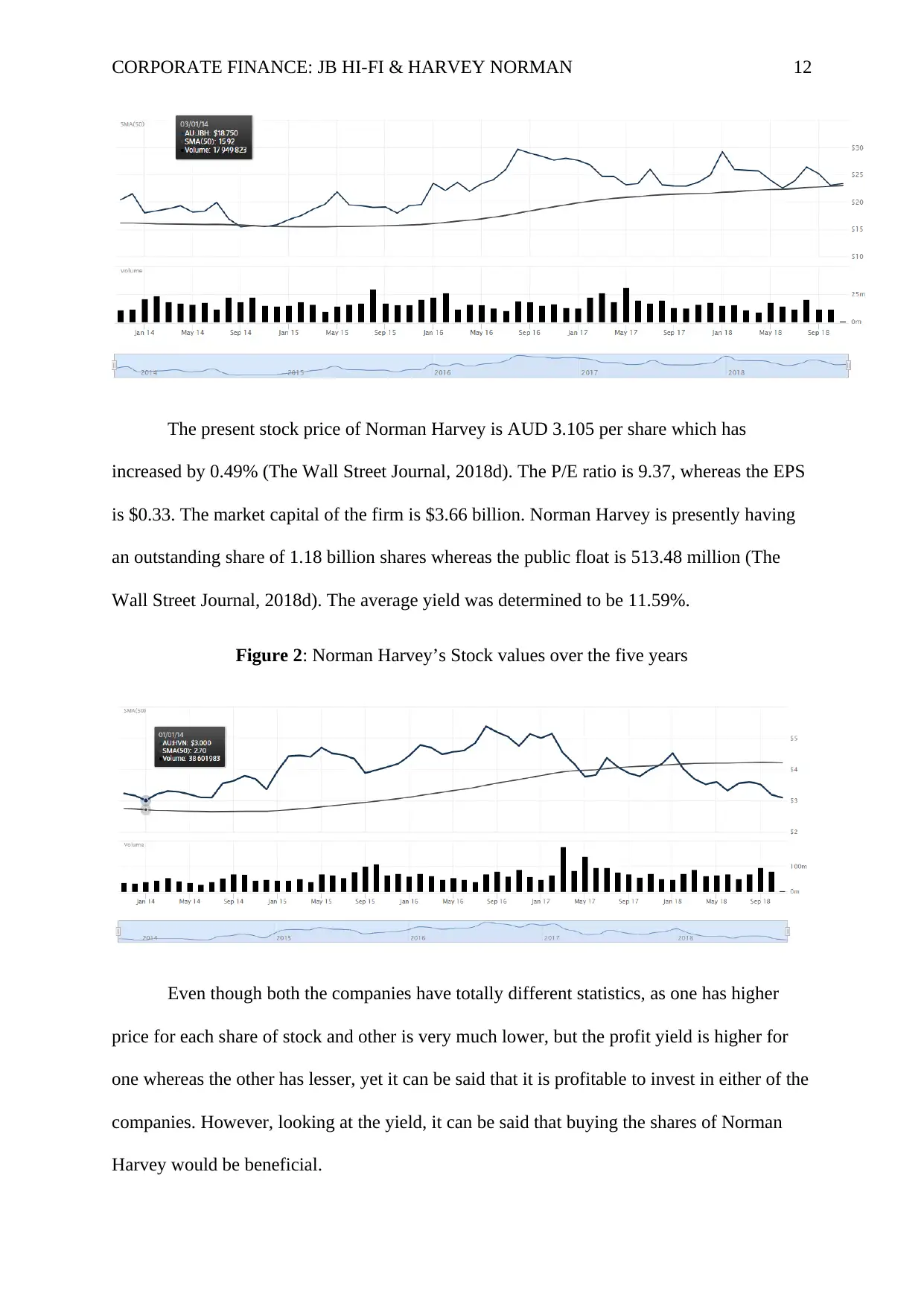
CORPORATE FINANCE: JB HI-FI & HARVEY NORMAN 12
The present stock price of Norman Harvey is AUD 3.105 per share which has
increased by 0.49% (The Wall Street Journal, 2018d). The P/E ratio is 9.37, whereas the EPS
is $0.33. The market capital of the firm is $3.66 billion. Norman Harvey is presently having
an outstanding share of 1.18 billion shares whereas the public float is 513.48 million (The
Wall Street Journal, 2018d). The average yield was determined to be 11.59%.
Figure 2: Norman Harvey’s Stock values over the five years
Even though both the companies have totally different statistics, as one has higher
price for each share of stock and other is very much lower, but the profit yield is higher for
one whereas the other has lesser, yet it can be said that it is profitable to invest in either of the
companies. However, looking at the yield, it can be said that buying the shares of Norman
Harvey would be beneficial.
The present stock price of Norman Harvey is AUD 3.105 per share which has
increased by 0.49% (The Wall Street Journal, 2018d). The P/E ratio is 9.37, whereas the EPS
is $0.33. The market capital of the firm is $3.66 billion. Norman Harvey is presently having
an outstanding share of 1.18 billion shares whereas the public float is 513.48 million (The
Wall Street Journal, 2018d). The average yield was determined to be 11.59%.
Figure 2: Norman Harvey’s Stock values over the five years
Even though both the companies have totally different statistics, as one has higher
price for each share of stock and other is very much lower, but the profit yield is higher for
one whereas the other has lesser, yet it can be said that it is profitable to invest in either of the
companies. However, looking at the yield, it can be said that buying the shares of Norman
Harvey would be beneficial.
⊘ This is a preview!⊘
Do you want full access?
Subscribe today to unlock all pages.

Trusted by 1+ million students worldwide
1 out of 14
Your All-in-One AI-Powered Toolkit for Academic Success.
+13062052269
info@desklib.com
Available 24*7 on WhatsApp / Email
![[object Object]](/_next/static/media/star-bottom.7253800d.svg)
Unlock your academic potential
Copyright © 2020–2026 A2Z Services. All Rights Reserved. Developed and managed by ZUCOL.

